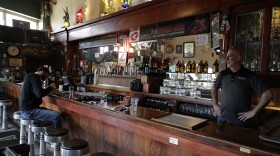Seattle has a reputation as a left-leaning ‘green’ city, but the current city council did not have a committee to address climate change. Instead, environmental issues shared the stage in the single five-member Sustainability and Tenants Rights committee.
Now, in the final weeks before a new council is sworn in, a Select Committee on Climate Action has come together. It has the sole focus of curbing emissions from large buildings. All nine of Seattle’s city councilmembers are included and expected to attend.
“We're in the midst of a climate crisis. But there are lots of other issues that the city is facing, and that often rise to the top in the public consciousness, like public safety and homelessness,” said Jessyn Farrell, a former state legislator who now directs Seattle’s Office of Sustainability and the Environment.
“We are really excited about this because it creates a mechanism to put a spotlight on climate,” Farrell said.
For starters, the committee will focus of finishing legislation put forward by Mayor Bruce Harrell to tackle emissions from large buildings that still run on fossil fuels. After transportation, these buildings are the second-greatest source of climate-warming emissions in Seattle.
But Farrell hopes the new city council that’s sworn in in January will reconstitute a similar committee to take up other critical issues, such as the city’s declining tree canopy.
On Nov. 15, Harrell sent an updated proposal to the city council, to establish a "Building Emissions Performance Standard" for existing buildings that are greater than 20,000 square feet.
Farrell said for decades, she’s been working on what seemed like a slow-moving crisis that was hard to communicate.
“But now we are in a time where heat and smoke and floods are impacting people who live in Seattle,” she said.
Seattle’s work on a buildings emissions standard started years ago, but stalled. With just two meetings scheduled and one piece of legislation to consider before the end of the year, Farrell is optimistic that the council will finally get it done. The proposed legislation is based on data collected by the city’s Office of Sustainability and the Environment.
“The only way we're going to be able to move forward on big hard things, like building emissions performance standards, is through consensus,” Farrell said.
“And by consensus, I don't mean watering things down, but by really creating values-aligned legislation – having a venue where every council member can be part of the conversation – and the constituencies that they represent,” Farrell said.
The aim is to cut 10% of Seattle’s emissions overall, through this policy, by the year 2050. It uses a combination of fees and incentives to wean buildings off of gas and oil for heating, cooling and cooking.
Climate activists said they wanted a stronger policy with higher fees per square foot for non-compliance and much faster timelines to get all buildings to net-zero emissions. However, Ben Jones, with the climate justice group 350 Seattle, said it’s important for the council to pass the proposal that's before them.
“With a more moderate city council coming in, we think this is the strongest building emissions performance standard we're going to get,” Jones said. “And we’re happy to have it.”
Washington has statewide standards through its 2019 Clean Buildings law. But those are focused on energy performance targets (efficiency) not emissions targets. They’re projected to only result in about a 4% reduction by 2030 in Seattle, because the city already has strong energy codes and high efficiency rates. The city’s proposed standard is designed to work in tandem with the state’s, encouraging building owners to go a step further and stop using fossil fuels.
The two meetings of the select committee are at 9:30 a.m. Wednesday, Nov. 29 and Thursday, Dec. 7. Councilmember Lisa Herbold will serve as chair and Council President Debora Juarez will serve as vice chair. Once passed out of committee, the full council can vote to formally adopt the standard.







